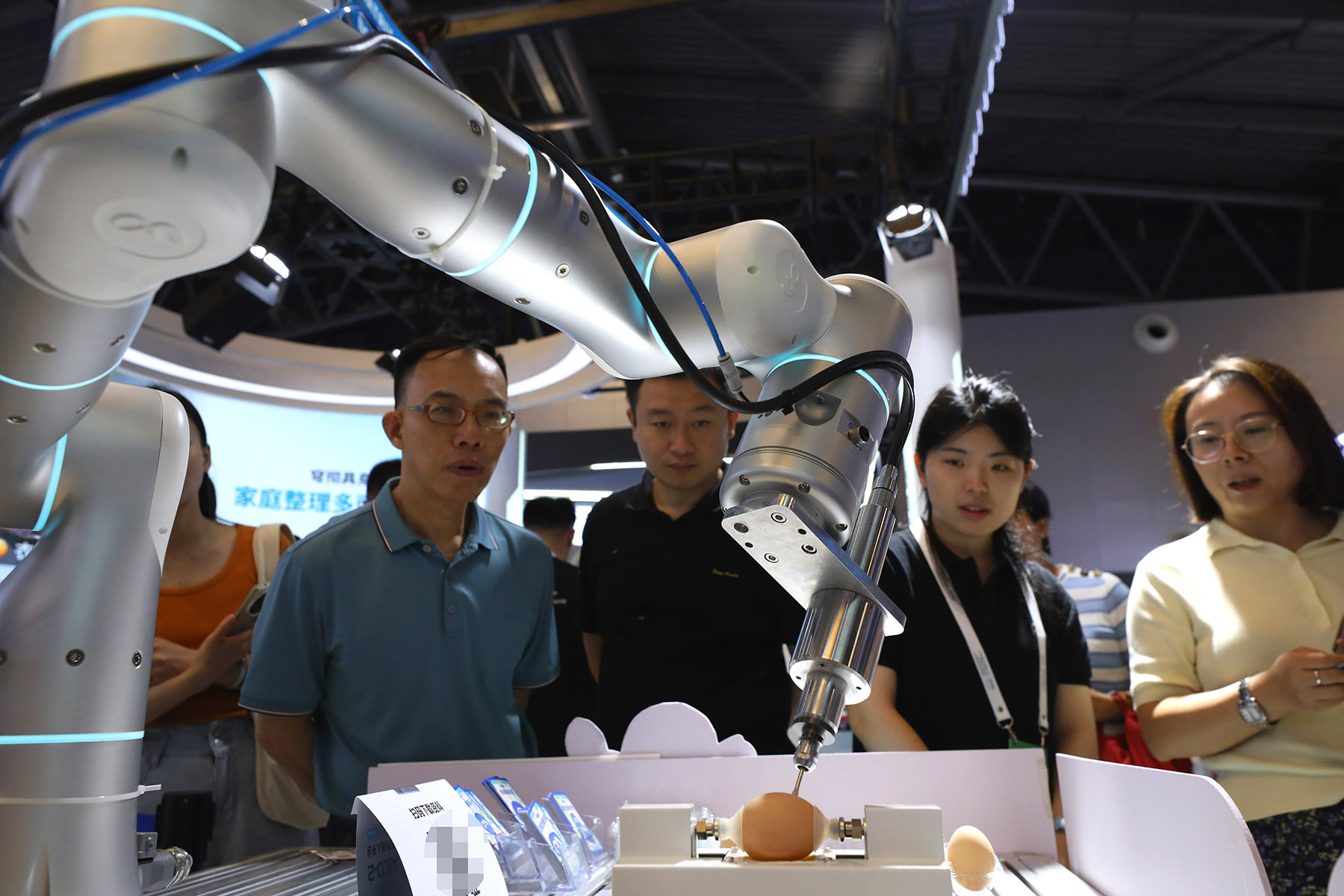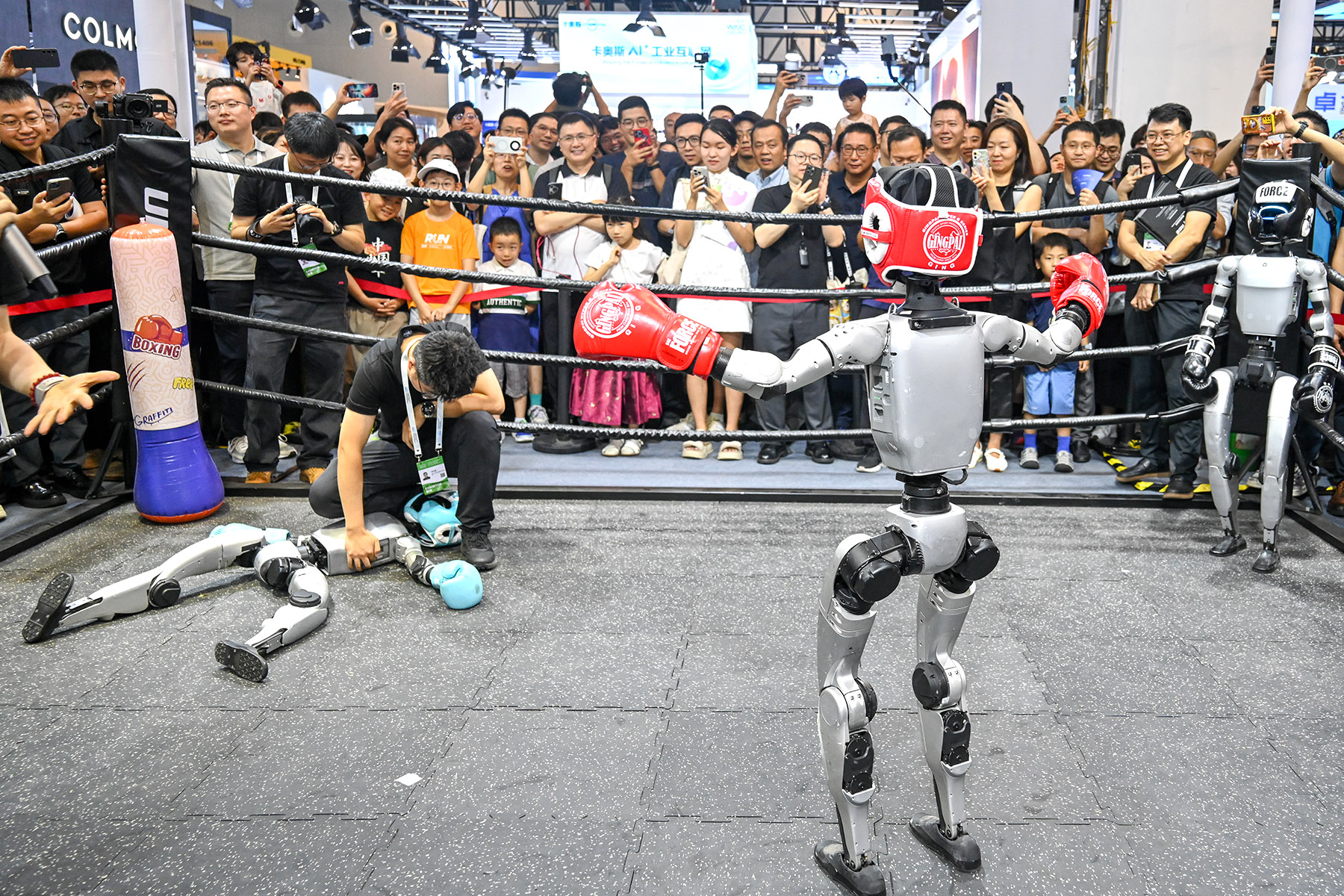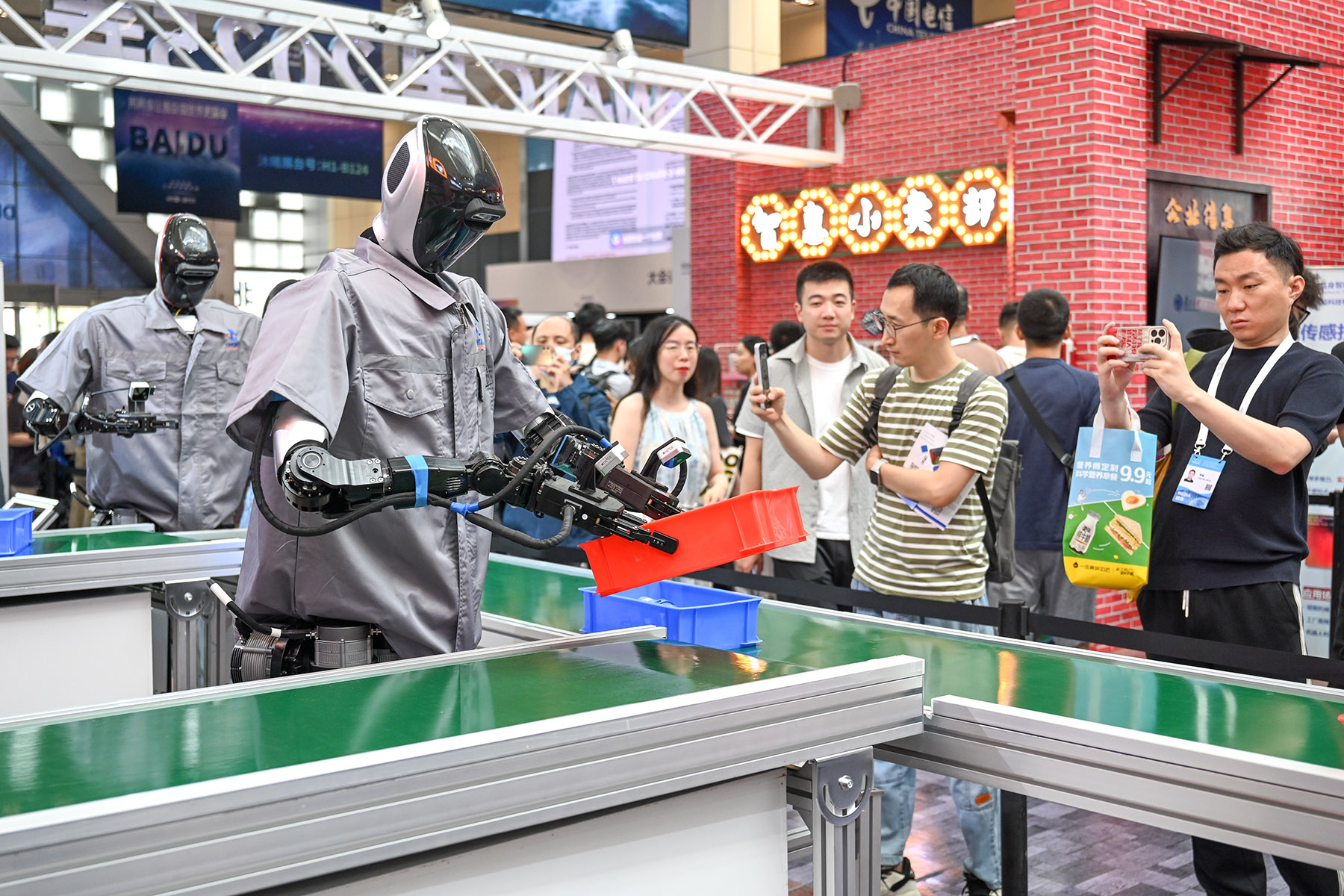'Industry plus artificial intelligence' cresting across Chinese manufacturing landscape, driven by tech companies scrambling to develop AI agents to solve tasks

At a textile mill in Suzhou, Jiangsu province, the rhythmic clatter of looms is now harmonized with a new sound: the silent, rapid-fire calculations of artificial intelligence.
China Telecom's "StarWeave Textile AI Agent" is relentlessly at work here — adjusting thread tension in real-time and scrutinizing fabric for flaws as it emerges, transforming an age-old craft in the process.
The results speak volumes: 99 percent on-time delivery, a 20 percent surge in productivity and near-perfect defect detection, China Telecom said.
This is not an isolated experiment, but a glimpse into a sweeping transformation where AI is rapidly becoming the indispensable engine powering China's industrial evolution.
Across the vast landscape of Chinese manufacturing, a wave of "Industry plus AI" is cresting, driven by the nation's tech companies, which are scrambling to develop AI agents to solve tasks.
ALSO READ: AI roadmap key to staving off challenges
AI agents are software systems that use AI to pursue goals and complete tasks on behalf of users. Unlike traditional AI, which may simply assist or provide recommendations, AI agents are capable of executing complex workflows without continuous human input. These agents are purpose-built to perform specialized roles within a company, such as customer support, data analysis, compliance checking or even performing financial tasks, experts said.
Li Lecheng, minister of industry and information technology, chaired a meeting in Beijing in June, outlining a comprehensive strategy to accelerate AI technological innovation and integrated application, thereby positioning AI as a core driver of China's new industrialization.
Xie Shaofeng, chief engineer at the Ministry of Industry and Information Technology, the country's top industry regulator, said at a news conference that the ministry has also coordinated with provincial governments to develop 11 national AI innovation pilot zones.
Meanwhile, central and local authorities have jointly built specialized manufacturing innovation centers for embodied AI robots, humanoid robots and other next-generation technologies to drive the development of industrial clusters, Xie said.

Hong Qunlian, a researcher at the National Development and Reform Commission's Chinese Academy of Macroeconomic Research, said: "Manufacturing is the focal point of competition among major powers and technological supremacy. Nurturing strategic advantages for the future fundamentally relies on the high-quality development of our manufacturing industry.
"Promoting AI-driven industrial upgrading is paramount for China's real economy over the next five years. And, achieving breakthroughs in critical technologies is not optional, it is essential, as we still face challenges in these areas."
Ryoji Sekido, co-CEO of Accenture Asia Pacific, said: "China stands at the forefront of global AI innovation and deployment, serving as an unparalleled benchmark for enterprise transformation.
"There is no better place to witness AI progress than right here in China and Shanghai. The ecosystem's rapid evolution is impressive."
Sekido highlighted how Chinese companies are transitioning from isolated AI experiments to comprehensive, enterprise-wide reinvention. He pointed to electric vehicle giant BYD as a paradigm-shifting case.
"This isn't about simple AI use cases. BYD harnessed AI end-to-end — from battery R&D and design automation to manufacturing and autonomous driving systems — fundamentally reinventing operations to accelerate time-to-market and capture dominant market share," Sekido said.
This approach, he stressed, represents "corporate reinvention", where AI becomes a strategic engine rather than a productivity tool.
The statistics also confirm the surge.
Market research company International Data Corp revealed a seismic shift: the proportion of Chinese industrial enterprises deploying large models and intelligent agents has skyrocketed from 9.6 percent in 2024 to 47.5 percent in 2025.
Crucially, those implementing these technologies across multiple operational areas have exploded from 1.7 percent to 35 percent.
"We're moving rapidly beyond isolated pilots," said Cui Can, senior research manager of IDC China. "High-value intelligent agent applications are landing and scaling."

IDC forecasts China's industrial AI spending to reach 90 billion yuan ($12.53 billion) by 2028, fueled by this accelerating adoption.
This is far more than mere automation.
AI is enabling a fundamental evolution in how Chinese industry operates, moving from fragmented point solutions toward interconnected, increasingly autonomous systems. "Industrial AI agents represent a critical lever," Cui said. "They drive the innovation cycle for essential industrial assets — datasets and large language models — creating a self-reinforcing ecosystem for advancement."
The applications are diversifying rapidly across the industrial landscape.
In May, Lenovo unveiled its manufacturing-focused AI agents, designed to fuse AI capabilities with decades of industrial know-how. Its "Supply Chain Control Tower" agent delivers staggering efficiency: decision-making accelerated by 50-60 percent, order fulfillment rates boosted by 5 percent, and a 20 percent reduction in manufacturing and logistics costs, Lenovo said.
The momentum is palpable.
Huawei entered the fray in June with FusionPlant 3.0, a strategic platform explicitly designed to accelerate the creation and deployment of industrial AI agents and smart applications.
The message from these companies is unequivocal: industrial AI is no longer speculative; it's operational, delivering concrete value.
Concurrently, companies like Shanghai Wisdom Information Technology Co Ltd are pioneering "industrial AI agents codriven by large language models", creating novel digital applications and multimodal AI cooperation specifically designed for manufacturing environments, focusing on end-to-end optimization.
Sector-specific revolutions are also unfolding, exemplified by Dongfang Precision Group's subsidiary, which is laser-focused on AI-driven transformation for the packaging industry, offering tailor-made industrial internet platforms and digital upgrade solutions.
Despite the impressive strides, the path forward demands more than isolated technological triumphs. Industry leaders and analysts alike stress that the next phase of industrial AI maturity hinges on robust ecosystem collaboration to overcome persistent hurdles.
The challenges, however, are multifaceted and deeply interconnected. Data fragmentation remains a major barrier, with inconsistent data hindering AI's full potential, and breaking down these walls necessitates industry-wide standards and cooperation, experts said.
Meanwhile, significant technological hurdles persist, including the limited generalization capabilities of large models while tackling highly specific, complex industrial tasks, and the critical bottleneck of computational power. "Computing power scarcity fundamentally constrains development. Yet utilization efficiency in training and inference is often paradoxically low," said Cao Kai, director of Smart Industrial Solutions at Baidu Smart Cloud.
ALSO READ: Autumn recruitment race for AI talent heats up
The transformation is undeniable. From Lenovo's streamlined global supply chain to the flawless fabric rolling off AI-monitored looms, intelligent agents are demonstrably enhancing productivity, slashing costs, and enabling unprecedented precision.
As these agents proliferate, learning and adapting within complex industrial ecosystems, they are evolving from sophisticated tools into the very central nervous system of modern Chinese manufacturing, experts added.
"Innovation stands as a pivotal force propelling the high-quality advancement of the manufacturing sector, and companies are increasingly assuming central roles in driving innovation," said Li Jinghong, an academician at the Chinese Academy of Sciences and a professor at Tsinghua University.
Ma Jun, senior vice-president of Volvo Group and president of Volvo (China) Investment, said: "We see great potential in China's AI growth. With its vast market and diverse application scenarios, China provides a unique space for AI innovation. I look forward to seeing more creative AI solutions in the transportation and infrastructure sectors, to help reduce logistics costs further and support sustainable development in China and globally."
Contact the writer at masi@chinadaily.com.cn


